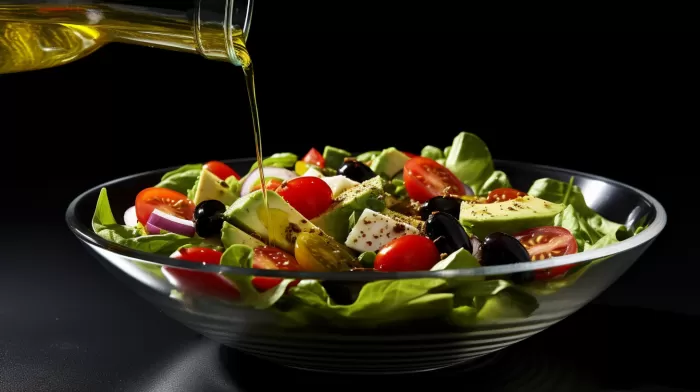Eating a salad can be a great way to load up on essential vitamins and minerals, but did you know that what you put on your salad is vital for effective nutrient absorption? Reap the full benefits of your healthy meal by learning the facts about salad dressings and the impact they have on nutrient absorption.
The role of fat in nutrient absorption
When it comes to getting the most nutrients from your salad, the type and amount of fat you use on your salad play a crucial role. The human body requires fat in the digestive system to properly absorb natural compounds like carotenoids from plant-based foods. Carotenoids, such as lutein, lycopene, beta-carotene, and zeaxanthin, have been proven helpful in reducing the risk of chronic and degenerative diseases like heart disease, skin cancer, and macular degeneration1.
Fat-free salad dressings: not the best choice
You might think that fat-free salad dressings would be the healthiest option, but researchers have found that these dressings significantly reduce the absorption of carotenoids2. “If you want to utilize more from your fruits and vegetables, you have to pair them correctly with fat-based dressings,” says researcher Mario Ferruzzi, a Purdue associate professor of food science. “If you have a salad with a fat-free dressing, there is a reduction in calories, but you lose some of the benefits of the vegetables.”
Choosing the right type of fat
Now you know that fat is essential for optimal nutrient absorption, but not all fats are created equal. A study from Purdue University revealed that olive oil on a salad helps your body absorb more beneficial phytonutrients than other oils. In contrast, polyunsaturated oils like soybean oil were found to be “dose-dependent,” meaning that the more oil on the salad, the more carotenoids people absorb. On the other hand, saturated fat like butter was also dose-dependent, but to a lesser extent. So what’s the best option?
The benefits of olive oil
Monounsaturated fat-rich dressings, such as olive oil-based dressings, were found to promote optimal absorption of health-promoting carotenoids from fresh vegetables. Furthermore, researchers discovered that consuming even a small amount of olive oil on a salad can greatly increase carotenoid assimilation3. Opting for an olive oil-based dressing not only helps you absorb more nutrients but also comes with various health benefits. Olive oil is known for supporting heart health, improving cholesterol levels, and providing antioxidants.
Beyond the salad dressing
Now that you know the most optimal way to dress your salad, it’s essential to pay attention to the ingredients in your salad to maximize nutrient absorption even further. Include a variety of colorful vegetables like spinach, tomatoes, and bell peppers to harness a wide range of carotenoids. Combine your salad with a source of protein like grilled chicken or tofu and healthy fats found in seeds, nuts, or avocado to make it a well-rounded meal.
Remember, it’s essential to be mindful of portion sizes. While fat is necessary for proper nutrient absorption, excessive amounts can lead to weight gain and other health issues. Practice moderation and find the right balance to gain the most benefits from your salad.
In conclusion, choosing an olive oil-based dressing for your salad is the best way to ensure optimal nutrient absorption from your meal. Pairing your salad with a variety of colorful vegetables, healthy fats, and a source of protein will give you a nutrient-dense dish that will keep you full and satisfied. So the next time you’re whipping up a salad, don’t forget the essential role of olive oil in helping your body reap all the health benefits offered by your fresh veggies.



